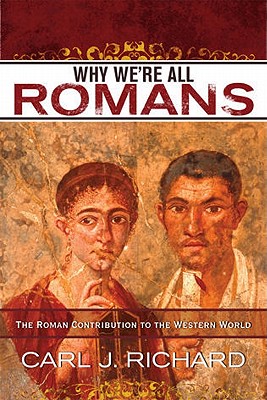Why We're All Romans: The Roman Contribution to the Western World

Why We're All Romans: The Roman Contribution to the Western World
This engaging yet deeply informed work not only examines Roman history and the multitude of Roman achievements in rich and colorful detail but also delineates their crucial and lasting impact on Western civilization. Noted historian Carl J. Richard argues that although we Westerners are "all Greeks" in politics, science, philosophy, and literature and "all Hebrews" in morality and spirituality, it was the Romans who made us Greeks and Hebrews. As the author convincingly shows, from the Middle Ages on, most Westerners received Greek ideas from Roman sources. Similarly, when the Western world adopted the ethical monotheism of the Hebrews, it did so at the instigation of a Roman citizen named Paul, who took advantage of the peace, unity, stability, and roads of the empire to proselytize the previously pagan Gentiles, who quickly became a majority of the religion's adherents. Although the Roman government of the first century crucified Christ and persecuted Christians, Rome's fourth- and fifth-century leaders encouraged the spread of Christianity throughout the Western world. In addition to making original contributions to administration, law, engineering, and architecture, the Romans modified and often improved the ideas they assimilated. Without the Roman sense of social responsibility to temper the individualism of Hellenistic Greece, classical culture might have perished, and without the Roman masses to proselytize and the social and material conditions necessary to this evangelism, Christianity itself might not have survived.
PRP: 157.64 Lei
Acesta este Prețul Recomandat de Producător. Prețul de vânzare al produsului este afișat mai jos.
141.88Lei
141.88Lei
157.64 LeiIndisponibil
Descrierea produsului
This engaging yet deeply informed work not only examines Roman history and the multitude of Roman achievements in rich and colorful detail but also delineates their crucial and lasting impact on Western civilization. Noted historian Carl J. Richard argues that although we Westerners are "all Greeks" in politics, science, philosophy, and literature and "all Hebrews" in morality and spirituality, it was the Romans who made us Greeks and Hebrews. As the author convincingly shows, from the Middle Ages on, most Westerners received Greek ideas from Roman sources. Similarly, when the Western world adopted the ethical monotheism of the Hebrews, it did so at the instigation of a Roman citizen named Paul, who took advantage of the peace, unity, stability, and roads of the empire to proselytize the previously pagan Gentiles, who quickly became a majority of the religion's adherents. Although the Roman government of the first century crucified Christ and persecuted Christians, Rome's fourth- and fifth-century leaders encouraged the spread of Christianity throughout the Western world. In addition to making original contributions to administration, law, engineering, and architecture, the Romans modified and often improved the ideas they assimilated. Without the Roman sense of social responsibility to temper the individualism of Hellenistic Greece, classical culture might have perished, and without the Roman masses to proselytize and the social and material conditions necessary to this evangelism, Christianity itself might not have survived.
Detaliile produsului










